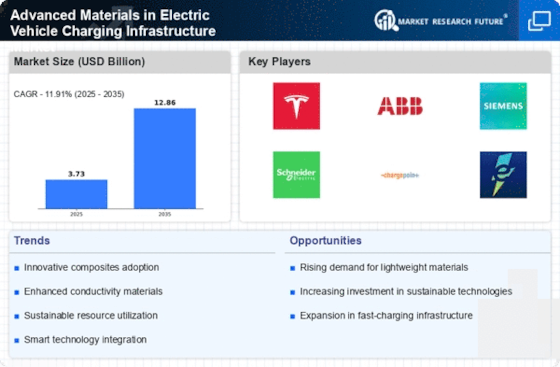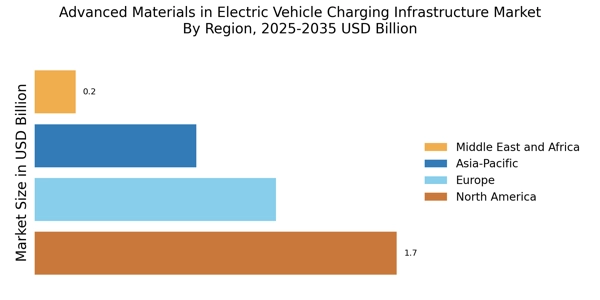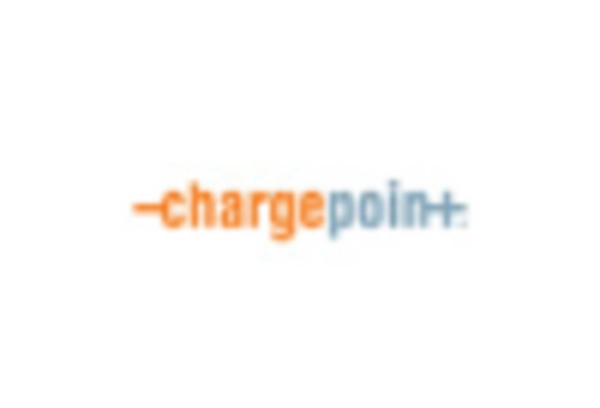Sustainability Initiatives
The increasing emphasis on sustainability initiatives is a pivotal driver for the Advanced Materials in Electric Vehicle Charging Infrastructure Market. Governments and organizations are actively promoting the use of eco-friendly materials to reduce carbon footprints. This trend is reflected in the growing adoption of advanced composites and bio-based materials in charging infrastructure. For instance, the market for sustainable materials is projected to reach USD 1 trillion by 2030, indicating a robust shift towards environmentally responsible practices. As electric vehicles gain traction, the demand for charging stations utilizing sustainable materials is likely to surge, thereby propelling the Advanced Materials in Electric Vehicle Charging Infrastructure Market.
Technological Advancements
Technological advancements play a crucial role in shaping the Advanced Materials in Electric Vehicle Charging Infrastructure Market. Innovations in material science, such as the development of lightweight and high-conductivity materials, enhance the efficiency and performance of charging stations. For example, the introduction of graphene-based materials has shown potential in improving charging speeds and reducing energy losses. The market for advanced materials is expected to grow at a CAGR of 15% over the next five years, driven by these technological innovations. As charging infrastructure evolves, the integration of cutting-edge materials will likely become a standard, further stimulating the Advanced Materials in Electric Vehicle Charging Infrastructure Market.
Government Regulations and Incentives
Government regulations and incentives are significant drivers for the Advanced Materials in Electric Vehicle Charging Infrastructure Market. Many countries are implementing stringent regulations aimed at reducing emissions and promoting electric vehicle adoption. These regulations often include incentives for the use of advanced materials in charging infrastructure, encouraging manufacturers to innovate. For instance, tax credits and grants for sustainable material usage can lead to increased investment in advanced materials. The market is projected to benefit from these regulatory frameworks, as they create a conducive environment for the development and deployment of advanced materials in charging stations.
Consumer Demand for Fast Charging Solutions
Consumer demand for fast charging solutions is a driving force in the Advanced Materials in Electric Vehicle Charging Infrastructure Market. As electric vehicle adoption rises, consumers increasingly seek efficient and rapid charging options. This demand necessitates the use of advanced materials that can support high-power charging capabilities. Research indicates that the fast charging market is expected to grow by 25% annually, highlighting the urgency for infrastructure improvements. Consequently, manufacturers are compelled to invest in advanced materials that enhance charging speed and reliability, thereby propelling the Advanced Materials in Electric Vehicle Charging Infrastructure Market.
Investment in Electric Vehicle Infrastructure
Investment in electric vehicle infrastructure is a critical driver for the Advanced Materials in Electric Vehicle Charging Infrastructure Market. As governments and private entities allocate substantial funds towards expanding charging networks, the demand for advanced materials becomes increasingly pronounced. Reports suggest that investments in charging infrastructure could exceed USD 100 billion by 2025, underscoring the urgency for innovative materials that can withstand diverse environmental conditions. This influx of capital is likely to stimulate research and development in advanced materials, fostering growth in the Advanced Materials in Electric Vehicle Charging Infrastructure Market.

















